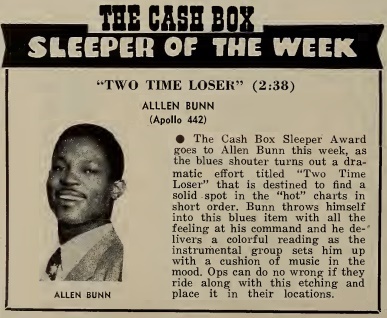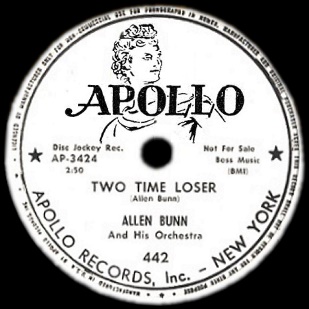Allen Bunn: “Two Time Loser”
19 Tuesday Sep 2023
Written by Sampson
Tags
No tags :(
Share it
APOLLO 442; SEPTEMBER 1952

When it comes to music not all experiments pay off commercially but that doesn’t mean they don’t work in an aesthetic sense.
The problem however is music is a business to those making records and so taking chances that fail to elicit a positive response that can be measured in sales and jukebox spins becomes a risky endeavor for conservative companies looking to pull coin in whatever cheap, shallow and exploitative manner they can think of.
This record doesn’t qualify in those regards and so the very fact it sounds unusual compared to most of the stuff on the market will have to be the hook that draws in some curious ears. If that doesn’t happen, the odds that the same company will be willing to venture down similar untested roads in the future becomes far less likely because no record label wants to lose twice on the same kind of long shot bet.
I’m Sorry To Have To Disappoint You
What do people actually WANT when they listen to a new record in the style they like?
I know that seems like a dumb question with an obvious answer, IE. “they want it to be good”, but beyond that, what are they hoping for?
With most people, unfortunately perhaps, the answer is probably they want something predictable. In other words, they like certain stylistic qualities and they’re merely hoping that it contains those attributes and are done reasonably well. If so, they’ll be satisfied and will elevate their opinion of the record accordingly.
We just looked at the first single by The Checkers, a vocal group who fulfilled the basic requirements of that subgenre. But the songs themselves were not very deep and lacked memorable, insightful or interesting lyrics, the arrangements were on the skimpy side and even the better aspects – the lead vocals – contained obvious missteps and in one case a badly executed spoken bridge.
In other words, though appealing enough not to hate, the contents of the records were slightly below average for what we’ve come to expect in that field which has seen huge strides in creativity and quality over the past few years. Yet for fans of that style that single still gave them the structure and components they love and so they’re willing to overlook their respective flaws and celebrate them for the mere presence of familiar traits.
Okay, I suppose there’s nothing wrong with that. Whatever floats your boat, they say. Like whatever you want and don’t worry if someone like me picks it apart for falling short in key areas. But if all you’re realistically hoping for each time you encounter a new release is something comfortable, where does the thrill of the unexpected fit in?

On Two Time Loser that is its primary appeal. It’s not that the techniques here haven’t been used before, but in rock this kind of hauntingly atmospheric arrangement is relatively rare and to couple that with a song that is well-written, emotionally sung and smartly produced to paint an appropriate picture of the scene they’re depicting that falls outside of the normal approach in rock is something that should stir people’s interest for that reason alone.
It’s true that records like this are not hit material, which may be why they’re far too rare. But because they’re not what we’ve come to expect that’s also the reason to want to hear more of them each time the needle drops, especially when they’re done this well.
Best One In The Whole Neighborhood
Stark sounding records that are exceedingly well-crafted often manage to show the art of arranging better than the denser sounding Wall of Sound tracks where there’s far so many instruments playing so many little things to keep track of them all.
Here we have a glacial paced echoing drum… probably not a kettle drum, but sounding like one which creates a foreboding mood. Big Chief Ellis’s intermittent piano playing choppy chords merely for color is overshadowed by the slow and gloomy tenor sax sounding a little less warm – and a little metallic – than is typical provides the main melodic touches, not to mention sets the mood firmly on the downcast side of the ledger.
Allen Bunn’s own guitar answers it, giving off an edgy, almost inquisitive, vibe, while the shallow breathing of the distant buzzing bass lends a sense of weary resignation to it all.
None of it reaches even trotting pace, which is just as well because Bunn’s vocal has to draw out each line as if he’s coming to grips with what he says just before the words leave his lips. The echo they place on his vocals, whether on the studio floor with mic positions or the kind baffles they’re using, or in the mixing board, furthers the sense of doom Two Time Loser embodies.

Is it any wonder they don’t use the more typical “three” for the title itself? One more loss and we’d have to dig Bunn’s corpse out of the grave for him to finish the song. So I guess the appropriate question to ask is what gave him this bleak outlook on life and how is he going to tell us about it?
Unsurprisingly it’s the breakup of a relationship that’s at fault, but we while don’t get the details of what led her to leave, or any resolution to his travails, we get plenty of insight into his deteriorating mindset. He’s so desperate for her return that he’s willing to sacrifice his self-respect to get her back, indicating that whoever else she was with, wherever she stayed and whatever she did while she was gone over the past year doesn’t matter to him, he’ll take her in without question.
The most evocative section involves him seeing a root doctor… sort of a backwoods healer in the plantation era South where traditional medicine was not made available to slaves and so root doctors used herbs and more “mystical” treatments to cure the sick as well as tend to their concerns. Expecting – or hoping – for good news or a way out of his predicament, Bunn gets neither from this source either, as the root doctor gives him a grim prognosis as well.
Though obviously a song with connections to the past like that, which is exacerbated by the more primitive feel conjured up by the arrangement as well, it still resonates in the present, or in 1952, simply because the subject matter has no expiration date. Lost loves are a source of unceasing pain throughout time and yet each person who endures it hopes their suffering will be short-lived, or better still, will be made well by some reconciliation that never comes.
Allen Bunn’s blues and gospel background allows him to tap into these musical and topical matters with confidence, while the arrangement manages to tie it into rock ‘n’ roll, even if it’s only tenuously. But it’s the audience’s own experience with the subject itself which forms the real connection, no matter the era.
Gone Again
I’m guessing that Apollo Records didn’t have much choice in the matter when it came to what material Allen Bunn was recording on his own, outside of The Larks.
He wrote his own stuff and there wasn’t much chance to push pop-sounding arrangements on him, not that Two Time Loser lent itself to such a sound anyway and maybe that’s why they didn’t bother to re-sign him when his stint with them as a solo act was up.
I’m sure they’d argue that they couldn’t afford to be a testing ground of unusual ideas, or to carry an artist who came up with consistently interesting material that sold little, but the question is… why not?

Given that the majority of any label’s singles are not going to make money and that even a tone-deaf owner like Bess Berman should be able to tell which sides are both badly performed, uncreative and non-commercial, wouldn’t it be smart to sacrifice one or two of those and use their vacated slots on the release rolls to allow for something adventurous like Allen Bunn was churning out?
Maybe it wasn’t ever going to become a smash on its own, but any true music fan encountering something this unconventional had to at least be intrigued enough by what they heard to check out more sides in the future leading to a bigger core audience to build off when Bunn releases something more predictable for the average listener to grasp.
The fomula itself might not be a sure thing when it comes to earning hits, but you could do far worse than having these kind of records dotting your catalog.
SPONTANEOUS LUNACY VERDICT:

(Visit the Artist page of Allen Bunn for the complete archive of his records reviewed to date)

